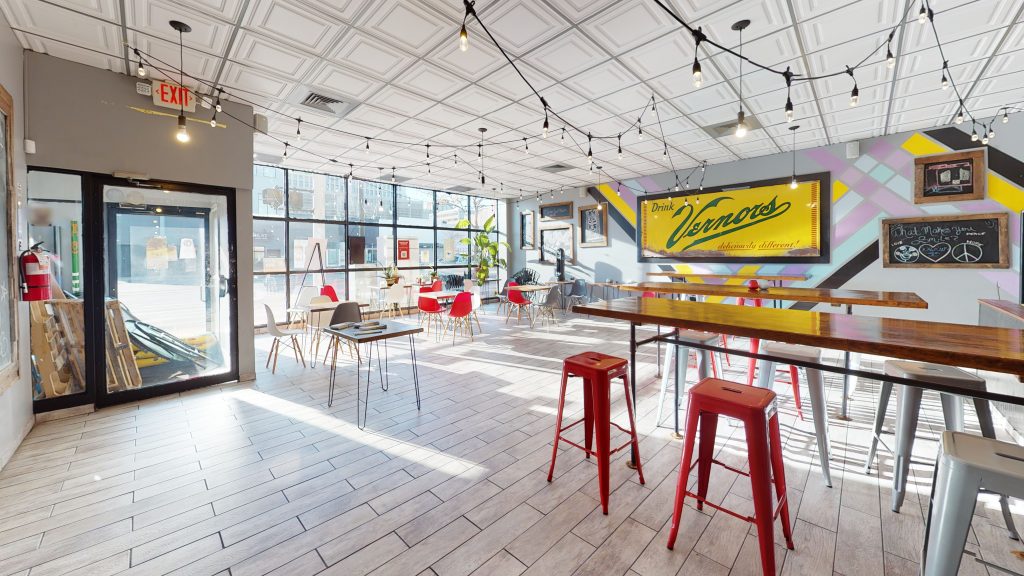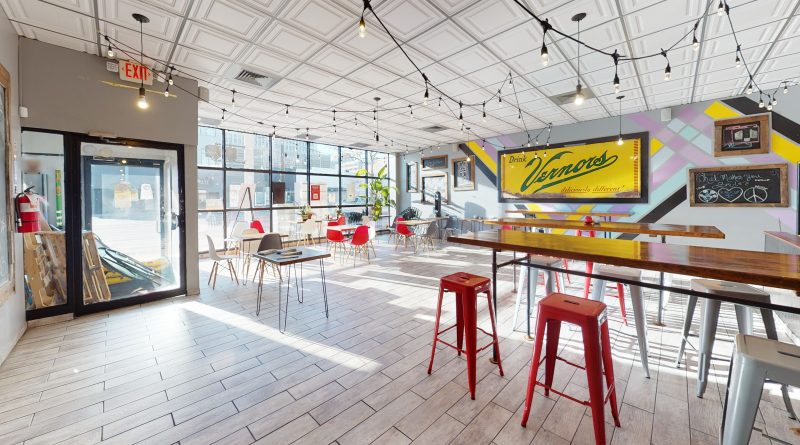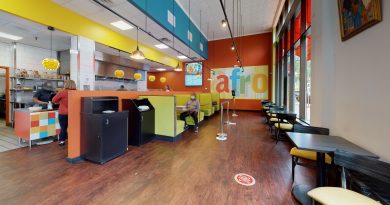Yum Village Will Bring The Fire In Detroit’s Takeout Dining Scene This Winter
The Afro-Caribbean fast casual joint occupies a corner storefront in an Art Deco building at the northeast corner of Milwaukee and Woodward Avenue. The building was once occupied by a Popeye’s and was, in an ironic, anti-neoliberal twist, then replaced by an independent business. Sadly, that business didn’t make it. Enter Nigerian-born Godwin Ihentuge, who quit the mortgage business to pursue his culinary and entrepreneurial passions. The restaurant raised money through a crowdfunding campaign and continues to operate a food truck.
It hasn’t been an easy year for the young entrepreneur, who had to weather the pandemic and survived a catastrophic car wreck earlier this year. But similar to my story about Abdirahman Kahin in St. Paul, Yum Village was able to successfully pivot not only to takeout-only but also to providing meals to first responders and those in need. Indeed, as I’m shooting my Matterport, a half dozen police officers come in for carryout.
And while the main dining room is currently closed, Ihentuge and a crew of co-conspirators continue to use it as a home base for entrepreneurial odds and ends. This is a point well-taken in the current economic uncertainty of a pandemic that has left folks commercial real estate scratching their heads. As I’m setting up my camera, native Detroiter, runner, and entrepreneur Joe Robinson (APX Interactive) is meticulously organizing a spread of t-shirts for We Run 313. The running club aims to build affinities in the community while getting people more active. I tell him, patting my midsection, ponderously, that I used to run cross country. Perhaps this would be a good incentive to get back into the game.

The Goods
Yum Village is proud to offer locally-sourced halal meats and only fresh ingredients. The signature jerk chicken seems to have a bit of range in spice, based on my dozen or so times trying it. On most days, the jerk is flirtatiously eyeing from a safe distance that line of inedibly, burn-your-face-off spicy. It is certainly the kind of spicy to reflect upon, but it is not for the faint of heart. (For the Anglo-Saxon Midwestern palates among ye: Fret not, for there are mild alternatives). The jerk sauce flavor is next level– managing to be a perfect balance of sweet, acidic, and spicy, without being too far in either direction. We live in a world of sauce, and I confess to having a sauce problem. But many sauces are far too gooey. Like, “store-bought unagi with corn syrup and corn starch emulsifiers” gooey. This was not that.
The ginger chickpeas are always a hit, as is the sweet pepper salad. The chickpeas are some sort of pan-fried, but not greasy, and the same was true for the corn cakes, which are somewhere between a hush puppy and cornbread. They’re a little sweet– not quite like a gulab jamun but nor like the low-to-zero-sugar varietal of cornbread I grew up with. You’ve also got spicy bean stew, brussels sprouts, plantains, and, of course, jollof rice. Be prepared to spend a bit of cash, but also be prepared to have leftovers. I left with– no lie- eight takeout containers from what was supposed to be a meal for two.
And… whiskey to wash it down?
It seems to be almost by accident that I notice a large display stand for Uncle Nearest whiskey at the counter. I’ve never heard of Uncle Nearest, and I consider myself a bit of a connoisseur. Not a snob, but certainly someone who at least thinks he knows whiskey. This is a product of having made the fatal mistake of making my first stop in a Duty Free store once upon a time while dating a Canadian and spending a lot of time across yon river. There’s a lot of good bourbon out there. Specifically, there’s a lot of good American whiskey (there’s a difference, ya see), and it’s only been in the past decade or so that American distillers of the aged grain spirit have actually recouped market share against Canadians, who had the lion’s share of the market for a century and a half from 1865 into the 2000’s.
Nathan “Nearest” Green was a distiller and freed slave who taught the original Jack Daniels the art of whiskey. The history isn’t entirely clear. Green was once a slave of minister and distiller Daniel H. Call, whose family distillery continues to produce whiskey to this day. The original history, maintained by the modern Call company, claims that Call himself taught Jack Daniels the art of distilling. But the Jack Daniels company’s own account concurs with a New York Times piece exploring the role of the freed slave as, indeed, the man behind the curtain of the distilling operation. Uncle Nearest is one of very few black-owned distilleries in the United States. And I have to say, it’s a hit. When I get back to hosting my whiskey tastings, Uncle Nearest will be at the top of the list.
Conclusion
Either Yum Village or Uncle Nearest are sure to warm you up in what is sure to be a cold winter. Support black business in Detroit– and definitely get some of them chickpeas.
This article is part of the Burgerbanism series on restaurants in their urban context.
It is also part of a series using Matterport imaging to highlight small and black-owned businesses, for which the Matterport company has provided us with generous support.



